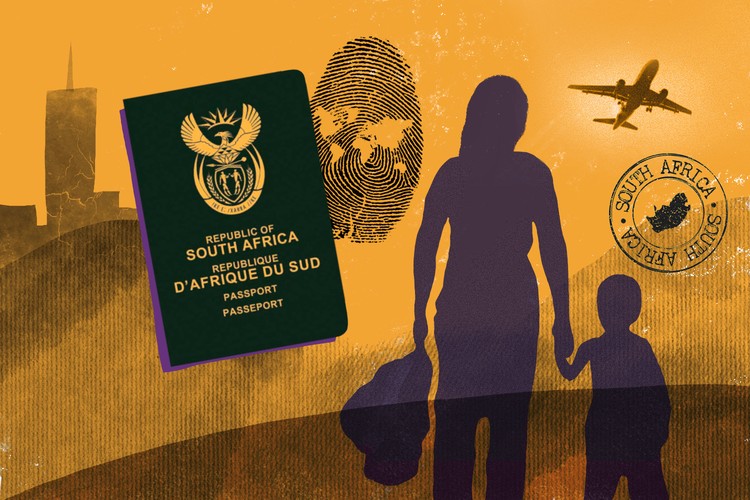Six distinctions but no ID: Top matriculant’s hope of becoming a doctor crushed
“My mother was a citizen, yet I cannot get an ID” says Emmanuel Ndlovu
Despite achieving six distinctions and a merit pass above 70%, 17-year-old Emmanuel Ndlovu cannot go to university because he does not have a birth certificate or an ID. Illustration: Lisa Nelson
- After achieving six distinctions in his matric exams, Emmanuel Ndlovu planned to go to university and become a doctor.
- But this has been put on hold because he does not have a birth certificate or ID.
- The law in South Africa gives children born to at least one South African parent the right to citizenship, but thousands of people still battle daily with bureaucracy at Home Affairs, says Lawyers for Human Rights.
Johannesburg matriculant Emmanuel Ndlovu had dreams of enrolling at the University of Cape Town or the University of Witwatersrand to pursue a career in medicine this year. But though he achieved six distinctions and a merit pass above 70%, 17-year-old Ndlovu is still sitting at home because he does not have a birth certificate or an ID.
“My peers are moving on with their lives, but I’m stuck,” he says.
Ndlovu and his four brothers do not have identity documents because their mother, a South African citizen, discovered that she was sharing an ID number with another person. She has struggled to rectify this for years but the Home Affairs system blocked her from registering her children. Ndlovu says he never knew his father.
He has been able to attend primary and high school without a birth certificate, because his mother could present his clinic card as proof of identity. To register and collect his matric exam results, Ndlovu managed to get proof of his birth from Leratong Hospital in Krugersdorp.
Ndlovu’s uncle, Emmanuel Ntimane, told GroundUp that he has tried to help his nephews obtain documents from Home Affairs. He went to the police station to sign an affidavit stating that he was their mother’s biological half-brother, who lived in Mozambique before moving to SA.
He submitted the affidavit, DNA tests and his naturalisation certificate to Home Affairs, but without success.
“I have tried my best, but nothing seems to work. All I want is for my nephews to get IDs so that they can progress with their lives,” said Ntimane.
Since his mother’s death last year, Ndlovu worries that he will remain stateless and may never be allowed to enrol at a university or get a job to support his siblings. For the past few months, he has been surviving by doing piece jobs.
Earlier this month, the Pretoria High Court ruled that the Department of Home Affairs must issue Primrose Modisane with a South African birth certificate and identity document. Modisane, in her 30s, had been battling decades of bureaucracy. Without legal recognition in either Zimbabwe or South Africa, she, like Ndlovu and his brothers, was unable to even open a bank account, let alone access social grants.
While her situation has been resolved, the Ndlovu brothers are in limbo.
The head of Lawyers for Human Rights’ Statelessness Unit, Thandeka Chauke, said statelessness often led to the “deprivation of fundamental rights such as education, healthcare, employment, and legal protection”.
Chauke said that the law allocated citizenship to anyone with at least one parent who was a South African citizen at the time of the child’s birth. She said the Constitutional Court in 2020 had reinforced this principle, emphasising that once it is proven that a person was born to a South African citizen parent, Home Affairs is obligated to recognise this citizenship “and take all necessary administrative steps to enable them to exercise their rights as a citizen”.
But despite this, said Chauke, thousands of people in South Africa continue to struggle with statelessness daily.
The Department of Home Affairs has asked GroundUp to share the family’s details so they can investigate the matter.
Support independent journalism
Donate using Payfast

Next: Companies should think twice before gagging journalists
Previous: Solar company changed its story just before gagging whistleblowers
© 2025 GroundUp. This article is licensed under a Creative Commons Attribution-NoDerivatives 4.0 International License.
You may republish this article, so long as you credit the authors and GroundUp, and do not change the text. Please include a link back to the original article.
We put an invisible pixel in the article so that we can count traffic to republishers. All analytics tools are solely on our servers. We do not give our logs to any third party. Logs are deleted after two weeks. We do not use any IP address identifying information except to count regional traffic. We are solely interested in counting hits, not tracking users. If you republish, please do not delete the invisible pixel.

